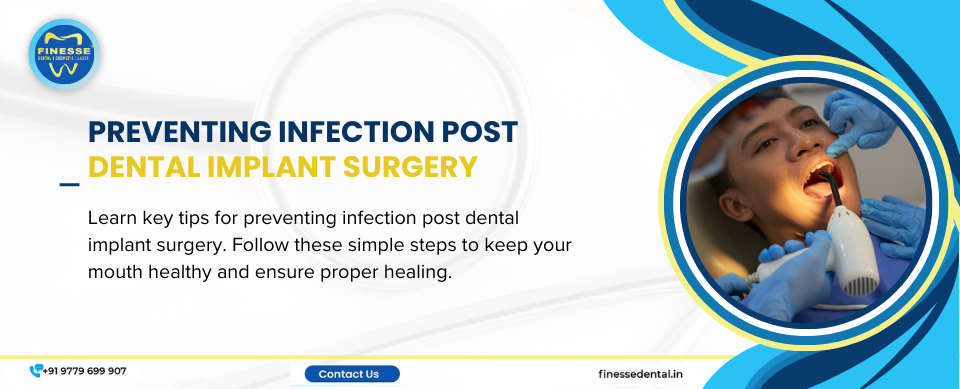Dental implant surgery is a procedure where metal posts or frames are placed into the jawbone beneath your gums. These implants act as a replacement for the roots of missing teeth and provide stable support for artificial teeth such as crowns or bridges. After undergoing such a surgery, it is crucial to take steps to prevent infections and ensure a successful recovery.
Why Infection Prevention is Important
Infections can occur after dental implant surgery due to the presence of bacteria in the mouth and the surgical site. If not managed properly, infections can lead to complications such as implant failure, prolonged healing time, and discomfort. Preventing infections is key to maintaining the health of your implants and ensuring the success of your smile designing treatment.
Steps to Prevent Infection
Here are important steps you can take to prevent infection after dental implant surgery:
Follow Post-Surgery Instructions: Your dentist will provide specific instructions on how to care for your mouth after surgery. Follow these instructions carefully to minimise the risk of infection.
Maintain Oral Hygiene: Keeping your mouth clean is essential. Brush gently using a soft-bristled toothbrush and rinse with an antimicrobial mouthwash as recommended by your dentist.
Avoid Touching the Surgical Site: Refrain from touching the surgical area with your fingers or tongue to prevent introducing bacteria.
Take Prescribed Medications: If your dentist prescribes antibiotics or pain medications, take them as directed to prevent and manage infection and discomfort.
Attend Follow-Up Appointments: Schedule and attend all follow-up appointments with your dentist. These visits allow your dentist to monitor your healing progress and address any concerns promptly.
Monitor for Signs of Infection: Be vigilant for symptoms such as excessive swelling, persistent pain, redness, or unusual discharge from the surgical site. Contact your dentist immediately if you notice any of these signs.
Lifestyle Tips for Recovery
In addition to specific steps to prevent infection, adopting healthy habits can support your recovery process:
Eat Soft Foods: Stick to a soft diet during the initial healing period to avoid putting undue pressure on the implants and surgical site.
Stay Hydrated: Drink plenty of water to maintain overall health and aid in the healing process.
Quit Smoking: Smoking can hinder healing and increase the risk of complications. If you smoke, consider quitting or reducing smoking during the recovery period.
Avoid Alcohol: Alcohol can interfere with the healing process and interact negatively with medications. It’s best to avoid alcohol consumption immediately after surgery.
Long-Term Care for Dental Implants
Once you have healed from dental implant surgery, ongoing care is essential to ensure the longevity of your implants and maintain oral health:
Brush and Floss Regularly: Adopt a consistent oral hygiene routine to keep your teeth and gums healthy. Use a soft-bristled toothbrush and dental floss to clean around the implants carefully.
Attend Dental Check-Ups: Schedule regular dental check-ups and cleanings to monitor the condition of your implants and overall oral health.
Protect Your Implants: If you participate in activities that could impact your mouth, such as contact sports, wear a mouthguard to protect your implants and natural teeth.
Conclusion
Preventing infection after dental implant surgery is crucial for the success of your smile designing treatment. By following the recommended steps for post-operative care, adopting healthy lifestyle habits, and attending regular dental visits, you can support the healing process and enjoy the benefits of your dental implants for years to come. If you have any concerns or notice signs of infection during your recovery, do not hesitate to contact your dentist for guidance and treatment.
Incorporating these practices into your routine will not only protect your dental implants but also contribute to your overall oral health and well-being. By taking proactive steps, you can maintain a healthy smile and enhance your quality of life with confidence.

